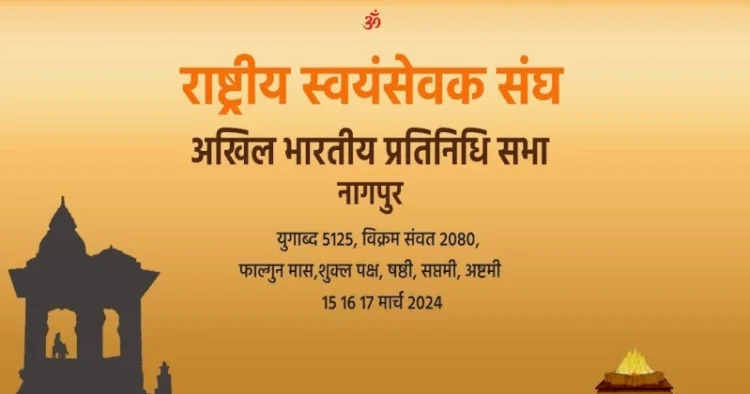The Rashtriya Swayamsevak Sangh’s ‘Pratinidhi Sabha’ which is scheduled to be held in Nagpur from March 15 to March 17, 2024, will focus on the future course of action and in-depth discussions on Sandeshkhali
The Sandeshkhali town in West Bengal has become the focal point of a women’s movement after serious allegations of sexual assault and pressurized slavery involving local politicians came on surface. This movement is community driven and is powered by the committed resilience of women. It has gained widespread national attention because of its meaningful importance and the potential consequences that it carries.
Senior swayamsevaks have expressed their commitment and promissed to address the issues affting the women of Sandeshkhali. Firsthand accounts and insights during the meeting will be shared by the karyakartas who are actively involved in the region and the Prant Pracharak, who oversees RSS activities in that area. The agenda of the meeting is to explore practical steps that RSS can take to assist and help survivors of the alleged abuses, along with providing a broader support mechanisms for future.
By actively engaging in such discussions and finding ways to contribute positively, RSS hopes to provide support to affected people and promote justice, empowerment within the community.
In this Rashtriya Swayamsevak Sangh (RSS) upcoming four day meeting, there will be participation of various affiliated organizations, including its political arm, the Bharatiya Janata Party (BJP). Distinguished political figures, including BJP’s national president JP Nadda and national general secretary BL Santhosh are also expected show their presence. The meeting will serve as a platform for the convergence of 1,570 senior members, featuring representatives from different spheres of the RSS, including ten senior members from the Rashtra Sevika Samiti. This itself emphasizes on the comprehensive nature of the meeting. Simultaneously, the farmers’ protest, a prominent nationwide issue, is likely to be on the agenda.
Through this gathering, key figures from the RSS and its affiliated entities, including political leaders will be actively present. The participation of members from the Rashtra Sevika Samiti emphasises the representation, showcasing the involvement of both male and female members in discussions and decision-making processes. Looking at the diverse composition of participants, it is clearly visible how important the event is to fulfil the collective agenda and direction of the RSS and its associated organizations.
Moreover, the participation of these representatives from different organisations, including the Rashtra Sevika Samiti, shows the collaborative approach that is being used to shape the collective ideology and actions of the Sangh Parivar.
The impact of this meeting extends beyond internal organisational matters. The decisions taken during this event can influence the broader political and social landscape of India. With representation from the BJP’s top leadership, the meeting will become a platform for aligning political strategies with the ideological foundation of the RSS. The outcomes may have effect on policies, strategies, and the overall direction of the Sangh Parivar in the near future.
In essence, the annual meeting of RSS will serve as a crucial moment for them and the affiliates. They can balance their objectives and adapt to changing socio-political dynamics. The discussions around Sandeshkhali will further highlight the organisation’s engagement with societal issues that are likely to present an understanding of the evolving challenges faced by the nation.


















Comments